CHILDREN'S BOOKS & WRITERS
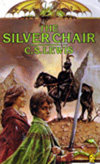 C
S Lewis: the famous Narnia books, the magic wardrobe and the
White Witch, "always winter and never Christmas" and so on. I'm not a
huge fan of these - the tacky Christian allegory really annoys me. The
best books are the ones Aslan doesn't keep popping up in - A Horse
and His Boy, The Voyage of the Dawn Treader, and The Silver
Chair. The final book, The Last Battle, is good too - very
apocalyptic and rounds off the sequence beautifully. But I just ca'n't
get over the whole "Aslan-rising-from-the-dead" thing, it really bugs
me. I hate being force-fed things 8(
C
S Lewis: the famous Narnia books, the magic wardrobe and the
White Witch, "always winter and never Christmas" and so on. I'm not a
huge fan of these - the tacky Christian allegory really annoys me. The
best books are the ones Aslan doesn't keep popping up in - A Horse
and His Boy, The Voyage of the Dawn Treader, and The Silver
Chair. The final book, The Last Battle, is good too - very
apocalyptic and rounds off the sequence beautifully. But I just ca'n't
get over the whole "Aslan-rising-from-the-dead" thing, it really bugs
me. I hate being force-fed things 8(
Diana Wynne Jo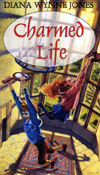 nes:
aaaahh, wonderful Diana. Her children's books are so much fun (so is her
only adult novel to date, A Sudden Wild Magic).
Take a look at the Chrestomanci books, Charmed Life, Witch Week, The
Lives of Christopher Chant, and The Magicians of Caprona, which
are set in a universe filled with counterfactual worlds, divided into
sets of nine. Everyone has a string of doubles, one in each world, save
in exceptional circumstances where the nine lives are concentrated in
one person, making them a very powerful enchanter. Chrestomanci is the
title which goes with the civil service job of being in charge of the
administration of magic. These books all deal with the events which befall
one particular Chrestomanci, Christopher Chant, an elegant and vague enchanter
and a wonderful character. If you read just one, make it - oh, just read
them all, I ca'n't decide!
nes:
aaaahh, wonderful Diana. Her children's books are so much fun (so is her
only adult novel to date, A Sudden Wild Magic).
Take a look at the Chrestomanci books, Charmed Life, Witch Week, The
Lives of Christopher Chant, and The Magicians of Caprona, which
are set in a universe filled with counterfactual worlds, divided into
sets of nine. Everyone has a string of doubles, one in each world, save
in exceptional circumstances where the nine lives are concentrated in
one person, making them a very powerful enchanter. Chrestomanci is the
title which goes with the civil service job of being in charge of the
administration of magic. These books all deal with the events which befall
one particular Chrestomanci, Christopher Chant, an elegant and vague enchanter
and a wonderful character. If you read just one, make it - oh, just read
them all, I ca'n't decide!
U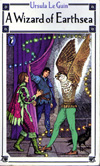 rsula
Le Guin: four very serious fantasy novels for older readers, A
Wizard of Earthsea, The Tombs of Atuan, The Farthest Shore
and Tehanu. These are *excellent*. They are set in the Archipelago,
a group of islands (obviously), centred on Roke Island, which houses the
School of Magic where young men go to learn wizardry. Ged (a.k.a. Sparrowhawk),
our hero throughout these four novels, goes to the school, and, being
an exceptional pupil, is soon bored with his studies and meddling with
things he is not ready for. Trying to call a spirit, he allows an evil
soul-eater through the divide between life and death, and must go on a
quest to track the creature down and destroy it before it can destroy
him. The other three books follow Ged's life on other quests and other
journeys, with the final book being a very adult look at relationships,
love, redemption, and how to pick up the pieces and start over when everything
you rely on has fallen apart. Highly recommended.
rsula
Le Guin: four very serious fantasy novels for older readers, A
Wizard of Earthsea, The Tombs of Atuan, The Farthest Shore
and Tehanu. These are *excellent*. They are set in the Archipelago,
a group of islands (obviously), centred on Roke Island, which houses the
School of Magic where young men go to learn wizardry. Ged (a.k.a. Sparrowhawk),
our hero throughout these four novels, goes to the school, and, being
an exceptional pupil, is soon bored with his studies and meddling with
things he is not ready for. Trying to call a spirit, he allows an evil
soul-eater through the divide between life and death, and must go on a
quest to track the creature down and destroy it before it can destroy
him. The other three books follow Ged's life on other quests and other
journeys, with the final book being a very adult look at relationships,
love, redemption, and how to pick up the pieces and start over when everything
you rely on has fallen apart. Highly recommended.
 Susan
Cooper: another fantasy writer, author of The Dark is Rising
sequence of six novels. These are good but not as adult as the Le Guin
novels. Set in England and Wales, they deal with an ongoing battle between
the Light and the Dark. There is a heavily Arthurian theme, particularly
in the last two novels, which are the best of the sequence. Her writing
is good and the stories are interesting, and the plot arc of the six novels
keeps you reading, as each book advances the overall story significantly.
Not as good as Le Guin, though, IMHO!
Susan
Cooper: another fantasy writer, author of The Dark is Rising
sequence of six novels. These are good but not as adult as the Le Guin
novels. Set in England and Wales, they deal with an ongoing battle between
the Light and the Dark. There is a heavily Arthurian theme, particularly
in the last two novels, which are the best of the sequence. Her writing
is good and the stories are interesting, and the plot arc of the six novels
keeps you reading, as each book advances the overall story significantly.
Not as good as Le Guin, though, IMHO!

Robin McKinley: writes fun fantasy books. Her female heroines are strong, feisty, independent, and great role models for girls. The Blue Sword and The Hero and the Crown are set in the land of Damar, and centre on the traditional plot of fantasy novels, the struggle between good and evil. My favourite book of hers is Beauty, a retelling of Beauty and the Beast. The characters are rounded and absorbing - you really care about what happens to them and whether things work out okay - whether they all live happily ever after. Reading this one is like cuddling up on the sofa with a box of choccies to watch a weepy movie - sheer self-indulgent pleasure 8)
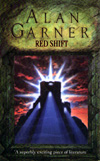
Alan Garner: another fantasy writer (do I ever read anything else? 8)) A fantastic writer, imaginative and very unsettling. Some of his books for older teens, The Owl Service and Red Shift, are really scary and disturbing. Even The Weirdstone of Brisangamen and its sequel, The Moon of Gomrath, which are for slightly younger readers, can be frightening, with their intimations of evil secrets lurking in the most placid of landscapes - they freaked me out completely as a child. The Owl Service still spooks me 8) Nothing is overtly frightening - no tacky blood and gore - just very eerie. Top-quality writing and very well worth a look.
C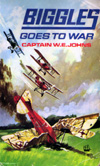 apt.
W E Johns: Moving away from the realms of fantasy we enter the realms
of good old-fashioned British stiff-upper-lippishness, derring-do, and
general all-round decent chap-ness 8). Yes, it's Biggles. Okay,
so along with all that Britishness there's the most appalling and cringe-inducing
racism, but presumably most modern children can sneer at that in the best
fashion. Actually, I ca'n't see most modern children wanting to read Biggles
at all. But they're missing out 8). Under all the bizarre Britishness,
the incredibly tacky race and class stereotypes, and the strange extension
of the books to the post-WWII world where they seem hopelessly out of
place, they're great! Firmly based in the belief that if you want things
done, do them yourself, and that God doesn't help those who don't help
themselves, they have a lot to say about using your brain, keeping cool
in a crisis and never giving up on a situation no matter how black it
may look. You can learn a lot of good life lessons from Biggles. Not to
mention a lot about aviation, geography, history...you name it, it'll
be in one of the books. Good stuff.
apt.
W E Johns: Moving away from the realms of fantasy we enter the realms
of good old-fashioned British stiff-upper-lippishness, derring-do, and
general all-round decent chap-ness 8). Yes, it's Biggles. Okay,
so along with all that Britishness there's the most appalling and cringe-inducing
racism, but presumably most modern children can sneer at that in the best
fashion. Actually, I ca'n't see most modern children wanting to read Biggles
at all. But they're missing out 8). Under all the bizarre Britishness,
the incredibly tacky race and class stereotypes, and the strange extension
of the books to the post-WWII world where they seem hopelessly out of
place, they're great! Firmly based in the belief that if you want things
done, do them yourself, and that God doesn't help those who don't help
themselves, they have a lot to say about using your brain, keeping cool
in a crisis and never giving up on a situation no matter how black it
may look. You can learn a lot of good life lessons from Biggles. Not to
mention a lot about aviation, geography, history...you name it, it'll
be in one of the books. Good stuff.
Edith Nesbit: - The Railway Children, Five Children and It, The Treasure Seekers, The Enchanted Castle...all absolute classics. Very old-fashioned but still great fun - her children are so mischievous and always getting into such scrapes, no matter how well-intentioned...you always want things to work out for them. And of course, since this is nineteenth-century children's fiction, they always do 8).
Summer of
my German Soldier by Bette Green. Great book about prejudice, fear,
and the importance of ideas and education. Patty is a teenager growing
up with
an ignorant, psychologically and physically abusive father. German POWs
are sent to the detention camp in her town and she strikes up a friendship
with one, Frederick Anton Reiker, who confounds all her prejudices by
being friendly, charming, educated, and humane. He escapes and she hides
him in her garage; in return he introduces Patty
 Marianne
Dreams by Catherine Storr. Marianne, on her tenth
Marianne
Dreams by Catherine Storr. Marianne, on her tenth
 Also
recommended is The Eagle of the Ninth, a historical story by Rosemary
Sutcliffe (another good children's writer). Marcus is a young centurion
sent to Britain to command a Roman outpost station. In an attack by the
native British, he is wounded, and is invalided out of the army, the only
life he has ever known. At a loose end, he teams up with a captured Briton,
a slave, and together they make a difficult and dangerous journey into
the heartland of the British tribes to rescue the captured Eagle of the
Ninth Legion, which years before marched into the north and never came
back. She gives a good idea of what Roman Britain must have been like,
so it's an educational as well as exciting story.
Also
recommended is The Eagle of the Ninth, a historical story by Rosemary
Sutcliffe (another good children's writer). Marcus is a young centurion
sent to Britain to command a Roman outpost station. In an attack by the
native British, he is wounded, and is invalided out of the army, the only
life he has ever known. At a loose end, he teams up with a captured Briton,
a slave, and together they make a difficult and dangerous journey into
the heartland of the British tribes to rescue the captured Eagle of the
Ninth Legion, which years before marched into the north and never came
back. She gives a good idea of what Roman Britain must have been like,
so it's an educational as well as exciting story.
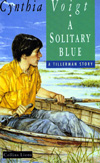 A
Solitary Blue by Cynthia Voight (one for older readers). Cynthia
Voight has written a series of novels about a young girl, Dicey Tillerman,
and her family. This book fits obliquely into that set, since the characters
it focusses on meet the Tillermans towards the end of the book. Jeff,
his hippie-dippy mother Melody and his father, an academic, live in Boston;
Jeff attends an elite school which his father teaches at, but never feels
he fits in. He adores his mother and is devastated to come home one day
and find a note saying she has left them and gone home to her Southern
family. Instead of showing his grief he buries his feelings under the
responsibility of keeping the household ticking over, and ploughs on with
things, living for the summers when he can go visit his mother - whom
he soon discovers to be rather less than the saint he has always believed.
The book tracks Jeff's slow-burning breakdown and his recovery. It's a
good, moving story and a great study of loneliness and isolation.
A
Solitary Blue by Cynthia Voight (one for older readers). Cynthia
Voight has written a series of novels about a young girl, Dicey Tillerman,
and her family. This book fits obliquely into that set, since the characters
it focusses on meet the Tillermans towards the end of the book. Jeff,
his hippie-dippy mother Melody and his father, an academic, live in Boston;
Jeff attends an elite school which his father teaches at, but never feels
he fits in. He adores his mother and is devastated to come home one day
and find a note saying she has left them and gone home to her Southern
family. Instead of showing his grief he buries his feelings under the
responsibility of keeping the household ticking over, and ploughs on with
things, living for the summers when he can go visit his mother - whom
he soon discovers to be rather less than the saint he has always believed.
The book tracks Jeff's slow-burning breakdown and his recovery. It's a
good, moving story and a great study of loneliness and isolation.
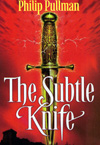 Philip
Pullman: I understand he's a much acclaimed young-adult writer, but
the only books I've read of his are the His Dark Materials sequence: a
projected trilogy, of which he's written the first two books, Northern
Lights and The Subtle Knife. These are amazing books, *so*
well written and so imaginative. The story arc is too complicated to describe
(and far too imaginative to sum up), but the focus is on the terrific
character of Lyra, young, tough, and street-smart, who is trying to stop
her uncle and his partner Mrs Coulter from destroying children and removing
the mysterious Dust from their universe. The villains are truly scary,
rather like in John Masefield's The Box of Delights - smooth and
suave and plausible, and therefore it's all the more terrifying to discover
the hatred and fanaticism under the polished veneer. Highly recommended,
and not just for children. Come on Philip and finish book three!
Philip
Pullman: I understand he's a much acclaimed young-adult writer, but
the only books I've read of his are the His Dark Materials sequence: a
projected trilogy, of which he's written the first two books, Northern
Lights and The Subtle Knife. These are amazing books, *so*
well written and so imaginative. The story arc is too complicated to describe
(and far too imaginative to sum up), but the focus is on the terrific
character of Lyra, young, tough, and street-smart, who is trying to stop
her uncle and his partner Mrs Coulter from destroying children and removing
the mysterious Dust from their universe. The villains are truly scary,
rather like in John Masefield's The Box of Delights - smooth and
suave and plausible, and therefore it's all the more terrifying to discover
the hatred and fanaticism under the polished veneer. Highly recommended,
and not just for children. Come on Philip and finish book three!
 :
a great, albeit old-fashioned, children's writer. Definitely one for little
girls - well, traditional little girls, anyway. Her Ballet Shoes
and White Boots are classic children's books, as are The Painted
Garden and Ballet Shoes for Anna. A Vicarage Family
is an autobiographical novel, beautifully and poignantly written, about
growing up in a small country town before the First World War and the
impact the war has on her and those around her.
:
a great, albeit old-fashioned, children's writer. Definitely one for little
girls - well, traditional little girls, anyway. Her Ballet Shoes
and White Boots are classic children's books, as are The Painted
Garden and Ballet Shoes for Anna. A Vicarage Family
is an autobiographical novel, beautifully and poignantly written, about
growing up in a small country town before the First World War and the
impact the war has on her and those around her. 